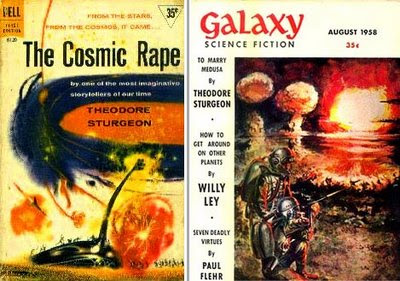
Good science fiction is fun to read. Great science fiction says something. Fantastic science fiction changes the way you think.
The Cosmic Rape by Theodore Sturgeon is good, great, and – most of all – fantastic. Sturgeon’s writing is (as always) fun and engaging, the story addresses identity and individuality, and – best of all -- Sturgeon changes the way you’ll think about one of the most common science fiction bug-a-boos: the idea of collective consciousness, a human hive mind.
Originally published in Galaxy Magazine as a novella called To Marry Medusa, the Cosmic Rape is initially told through a series of characters, each one separated from everyone around them and the rest of the world by shame, miscommunication, guilt, fear, and inexperience. Paul Sanders is a empathy-less sexual opportunist, Guido is a teenage musical genius trapped by an abusive history into a life of violence against the music he subconsciously craves, Dimity Carmichael is a self-satisfied abstinent getting off on the sexual sufferings of others, Mbala is a tribesman fighting his own fears along with the demon stealing yams from his family’s scared patch, Henry is a boy living a life of unrelenting fear, and Sharon Brevix is a little girl lost in the middle of the desert.
Flowing, separately at first, between these characters is the skid-row loser Gurlick who just happened to have bitten into a discarded hamburger – a hamburger containing a scout seed from a galaxy-spanning hive mind called Medusa.
But Medusa has a problem: every other lifeform it’s absorbed into itself has been in some way a shade of its own collective consciousness. Humanity, though, is different: here everyone is separated and alone, disconnected and unique.
So, thinking that humanity must have been together at one time but then broke apart, Medusa the alcoholic out to find a way to "put people’s brains back together again" by promising the smashed-up and broken Gurlick whatever he wants.
Like everything of Sturgeon’s, The Cosmic Rape is brilliantly written: the characters are rich and full and alive, the language is equal parts lyrical, poetic, and carefully structured and classical. Also like everything else of Sturgeon’s, the story is bright and clear, a sneaky trick that takes you completely by surprise without ever resorting to cheap devices.
Here too are Sturgeon’s favorite subjects: the explosion of what is sex and sexuality (as in Venus Plus X), the careful and perceptive look at humanity (as in Godbody) and especially the reinvention of what consciousness is and could be (as in More Than Human).
There is a part of The Cosmic Rape that lays it all out: the fun reading, the perfect ‘something’ that great science fiction has, and especially the way Sturgeon changes how we think but I won’t just excerpt it here because that would be … well, wrong. Like – maybe, just maybe overdoing it a bit -- pasting in Michelangelo’s God Creates Adam without the whole of the Sistine Chapel’s ceiling. You have to read it yourself, but to give you an idea of what happens in that chapter, as well as the whole conclusion of the book, just think about the idea of a hive mind, a united human consciousness.
It’s an old science fiction cliché, from Star Trek’s borg to the Flood of Halo: "resistance was futile" and all that. Lots of folks lay awake at night and shudder at the thought of being merged, combined with something else, of losing their identity to some monstrous and hungry collective. But what Sturgeon did with The Cosmic Rape is to take that idea and twist it, turn it upside down and make it not hideous and frightening but warm, welcoming and wonderful: a humanity without judgment or fear, loneliness or shame, a united mankind of acceptance and understanding.
I can’t recommend The Cosmic Rape enough. It's fun to read like all good science fiction, it says something important like all great science fiction, but best of all it’s fantastic because Sturgeon manages to change the clichéd terror of a collective humanity into something that, like the book itself, is brilliant and wonderful.
No comments:
Post a Comment